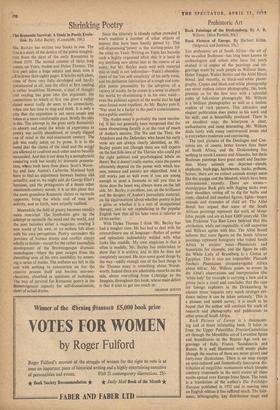Shrinking Poetry
The Romantic Survival: A Study in Poetic Evolu- tion. By John Bayley. (Constable, 18s.).
MR. BAYLEY has written two books in one. The first is a study of the destiny of the poetic imagina:- tion from the days of the early Romantics to about 1939. The second consists of three long essays, on Yeats, Auden and Dylan Thomas. The first part takes a huge subject and deals with it all in fewer than eighty pages. It bristles with ideas, none of them very fully developed and hardly documented at all; and the effect at first reading. is rather breathless. However, a. deal of thought and reading has gone into this argument; the connections to which at first one gives a rather dazed assent really do seem to be connections, when one has time to stop and think. It is only a pity that the exposition is not more ample and taken at a more comfortable pace. Briefly the idea is this. The attempt by the great early RomantiCS to ,absorb and unite the whole of experience in poetry was tacitly abandoned, or simply slipped out of mind in the mid-nineteenth century. The job was really •taken on by prose. It is in the novel that the claims of the ideal and the actual are allowed to confront each other and to become reconciled. And this is not done by a metaphysieal conjuring trick but simply by dramatic presenta- tion, where both have their place. Scott's Waver- ley and Jane Austen's Catherine Morland both have to find an adjustment between fantasy and actuality; and so, we might add, do George Eliot's heroines, and the protagonists of a dozen other nineteenth-century novels. It is on this plane that the more grandiose Romantic claims to reconcile opposites, bring the whole soul of man into activity, and so forth, were actually realised.
Meanwhile the field of poetry becomes steadily more restricted. The Symbolists give up the attempt to reconcile the mind and the world, and the poet becomes either a magician, creating la new world of his own, or an aesthete left alone with his own perceptions. Poetry surrenders the province of human drama and conflict almost wholly to fiction—except for the rather anomalous development of the Browningesque dramatic monologues—where the poet escapes from the dwindling area of his own sensibility by assum- ing a series of masks. The asthetes are left in the cad with nothing to concentrate on but the creative process itself and become nee-neo- classicists, absorbed in questions of technique. The way of survival for Romantic poetry is the Browningesque capacity for self-dramatisation, short of actual drama.
Since the itinerary is already rather crowded I won't mention a number of other objects of interest that have been hastily passed by. Thip self-dramatising power is the starting-point for the essay on Yeats. Writing on Yeats has become such a highly organised affair that it is hard to say anything new about him in the course of an essay; but Mr. Bayley deals well with material that in itself is not unfamiliar—Yeats's abandon- ment of the 'too soft simplicity' of his early verse, and his deliberate fabfication of a tough and com- plex poetic personality by the adoption of a variety of masks. So he comes in a sense to absorb the world by dramatising it in his own mind— even the political aspects of the world that he ha4 once found most repellent. As Mr. Bayley puts it, 'War must be a factor in the poet's consciousness, not a public emotion.'
The Auden essay is probably the most success- ful. It has not generally been recognised that the same dramatising faculty is at the root of much. of Auden's success. The We and the They, the Attackers and the Defenders who haunt his early verse are not always clearly identified, as Mr. Bayley points out (though there are still experts on the lost folk-lore of the Thirties who could put the right political and psychological labels on them). But it doesn't really matter, since the poems ultimately depend on the power with which ten- sion, menace and anxiety are objectified. And it still works just as well even if you are young enough to need a footnote to tell you that in those days the heart wak always worn on the left side. Mr. Bayley is excellent, too, on the brilliance and the dangers of Auden's journalistic material; on his equivocations about whether poetry is just a game or whether. it is a sort of occupational therapy; and in not capitulating to the popular English view that all his later verse is inferior to all his earlier.
With Dylan Thomas I think Mr. Bayley • has had a tougher time. He has had to deal with his extraordinary use of language—flashes of power and splendour indissolubly welded with what looks like muddle. My own suspicion is that it often is muddle; Mr. Bayley has undertaken to show that it is artistry, and in this he does not completely succeed. He says some good things by the way—oddly enough one of the best things in the Thomas essay is something about Words- worth. Indeed there are admirable remarks on the side, about everything from Coleridge to the Imagists, throughout this book, whose main defect is that it tries to get too much in.
GRAHAM HOUGH


































 Previous page
Previous page